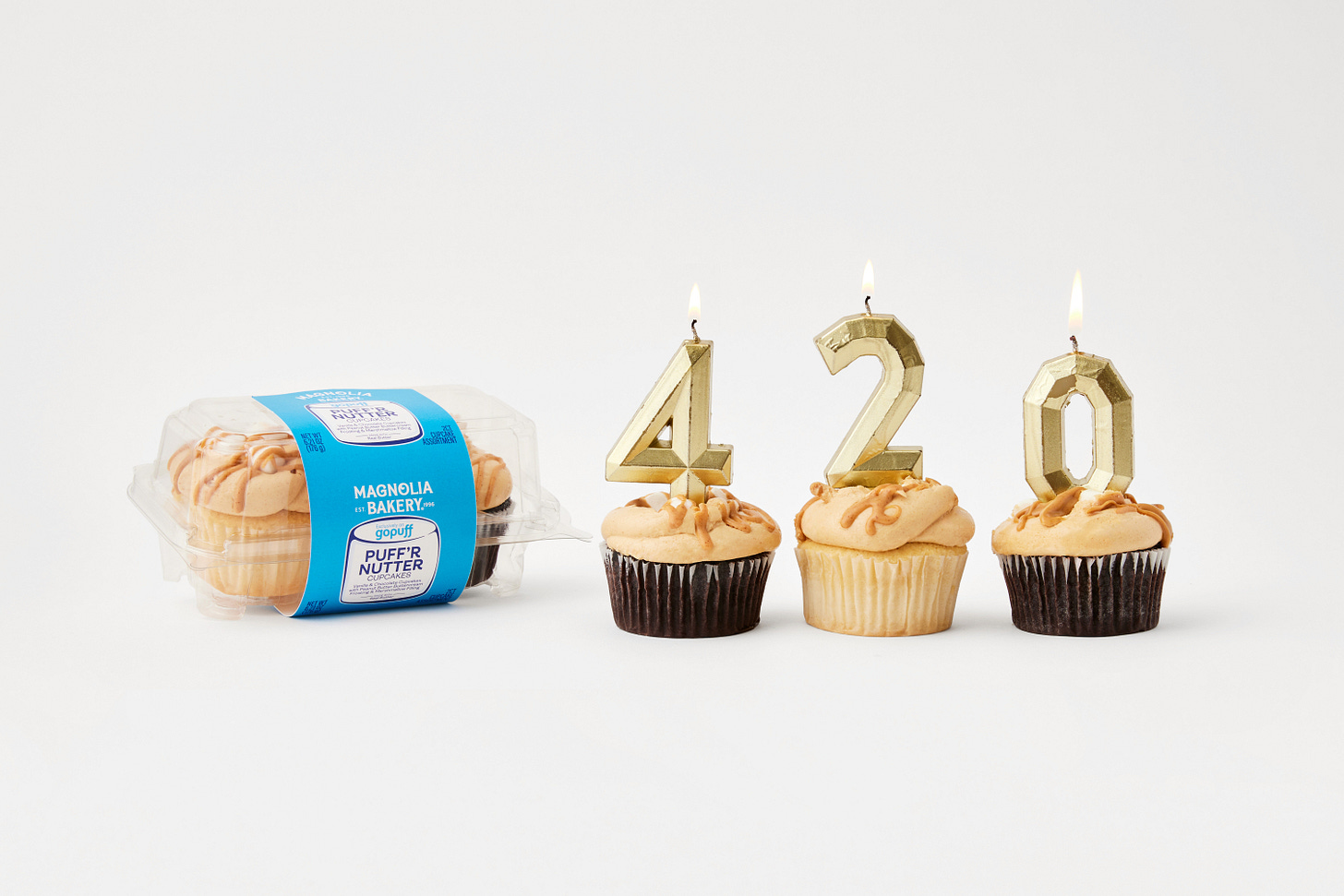Even chocolate bars are getting a protein makeover...
CPG and Retail news from the week of 4/14/25
Hello hello!
We have some fun things coming to Express Checkout this week, including a new second weekly send!
I’m heading to GROW LA and Commerce Roundtable this week. If you’re around, hit me up! - Nate
*Brought to you * by the wonderful folks at Settle
Building a CPG brand right now isn’t easy. Costs are rising, supply chains are shifting, and growth requires more operational clarity than ever.
That’s how Carnivore Snax went from a Kickstarter campaign to $20M+ in revenue. With a strong grip on unit economics, a strong supply chain, and Settle as their financial partner, they’ve been able to grow quickly—without giving up control.
Together with Settle and their CFO from Greenhouse, they’ve:
Funded inventory and equipment without raising VC
Saved 20+ hours/month using Settle Bill Pay
Navigated an unexpected shutdown and came back stronger
Settle helps brands turn operational chaos into clarity—so you can keep scaling with confidence.
News From the Week 🍃
This week (for obvious reasons…), we're diving into THC x CPG—a seriously growing category that’s reshaping everything we thought we knew about
Here's what's clear from our conversations and research (longer deep-dive featuring four interviewees to come!!):
Retail Transformation: Thanks to regulatory changes starting with the 2018 Farm Bill, THC products have begun their trek from dispensaries to mainstream retail. In 2025, Total Wine locations dedicating 20+ feet of aisle space to THC products and, according to our friends at Green Street Beverages, the category is representing up to 14% of revenue in some stores—mostly additive rather than cannibalizing alcohol sales.
Microdosing Movement: The industry has embraced moderation, with most popular beverages containing just 2-5mg of THC (plus edibles Mary & Jane offering 1mg Microdosed Melts). These microdoses offer predictable, controlled experiences that appeal to newcomers and experienced users alike.
Demographics Shifting: Forget the stereotype. Today's THC beverage consumer isn't just the "stoner." The brands we spoke to have been seeing significant adoption among suburban professionals, wellness-focused millennials, and perhaps most surprisingly, boomers—with Mary & Jane’s customers ranging from 21 to “literally 86” and Cann reporting “an over-70 population” as one of their target demos.
On-Premise Revolution: In states with permissive regulations, bars and restaurants are adding THC drinks to their menus, creating new social dynamics and revenue opportunities.
There are a ton of products out there, here are some Jenna and I are enjoying!
Wims Social Pocket Tonic: A mixer format with 4mg THC and 4mg CBD.
Cann: Their 2mg THC/4mg CBD seltzers offer a light buzz with upscale flavor profiles (loving the Blood Orange Cardomom).
Mary & Jane: Not a beverage, but their 1mg microdose “melts” are amazing, portable, and more easily absorbed.
Louie Louie: A New Orleans-based beverage brand making waves with their on-premise presence in select markets.
Wynk's New Lemonade Flavors: Fresh takes on a classic summer beverage with the perfect microdose.
Goodtime Spirits THC Beverage Enhancers: Concentrated formulations you can add to your own beverages—similar to Win's concept but offering more customization options.
CPG & Consumer Goods
The candy bar that has everyone talking. RXBar co-founder Jared Smith launched his next venture, Hormbles Chormbles (say it two times fast, dare ya)—a line of high-protein, zero-sugar chocolate bars containing 10g of protein, only 100 calories.
Now, both RXBar co-founders have founded new protein-centric brands that are major departures from RXBar’s OG messaging—pivoting from counting almonds to counting macros.
And this pivot comes at an interesting time in the better-for-you discourse: Half of the health community is hellbent on whole foods and “real” ingredients (RXBar’s MO), while others are preaching a gains-at-all-costs diet—taking protein from any source that’s edible (or in Hormbles Chormbles’ case, vaguely pronounceable).
 Tiktok failed to load.
Tiktok failed to load.Enable 3rd party cookies or use another browser
Speaking of protein…our favorite protein brand, Clean Simple Eats, moved into select Target stores, expanding from from a traditionally DTC brand.
We both loved the brand’s new Clear Whey protein powder in Pink Burst—one of our favorite Expo West sips! It tastes shockingly like real pink starbust (objectively the best flavor—will be taking no notes at this time).
Is plant-based back? Kraft Heinz launched its first plant-based dessert, Jell-O Oat Milk Chocolate Pudding, through its partnership with the food tech company, NotCo.
Kraft Heinz and NotCo have a long history of dairy-free products since they launched their partnership in 2022, including: sliced cheese and Mac & Cheese for dairy, mayonnaise for egg and most recently, Oscar Mayer hot dogs and sausages, for meat.
While the oat-based food market is expected to grow (~7% CAGR through 2030), we can’t help but feel like this launch is another example of a BigCo brand taking too long to innovate. Shouldn’t dairy-free pudding have existed in like…2020??
…or is plant-based in trouble? Perfect Day, a US food tech startup, is facing a false marketing lawsuit from the Organic Consumers Association and GMO/Toxin Free USA over its animal-free dairy whey protein, ProFerm—the first lawsuit targeting precision-fermented animal-free protein.
The plaintiffs—who seem to have a vested interested, here—accuse Perfect Day of “misrepresentation to the FDA”, for marketing its precision fermentation dairy as “identical” to cow’s milk.
It’s been a funky couple of years for Perfect Day. After announcing a $90M Series E raise, the startup sold off its consumer brands division and gave away half of its stake in a leading manufacturer.
More retailers get a hero. Hero Bread, the brand making low-carb, high-protein bread products (think: tortillas, croissants, bagels, and more), is seriously expanding its retail presence—from 4,400 to 6,000 stores, including Albertsons and Whole Foods Market.
eCommerce
A customer service rep that doesn’t sleep. Postscript just launched Shopper, a new AI shopping assistant that helps SMS subscribers find the right products, answers their questions, and recovers carts. Plus it’s customized to your brand voice, 24/7.
Your new local bakery? Gopuff. Gopuff launched "The Bakery," a new in-app category featuring fresh-baked goods (perfect to satisfy munchies), in collaboration with Magnolia Bakery—including the Gopuff exclusive Puff’rnutter Cupcake.
Retail
So. Many. Slurpees. 7-Eleven plans to open 1,300 new stores in North America by 2030, aiming to double the number of locations that include Quick Service Restaurants from 1,080 to 2,100. This expansion is part of the company's strategy as it prepares for a potential IPO in 2026.
Another one bites the dust. Canadian sustainable apparel brand Frank and Oak is closing its U.S. operations by the end of April and liquidating—all due to uncertainties surrounding tariffs and customs.
Walmart goes geospatial. Walmart is remapping its delivery zones with new, customized geospatial technology. The goal? Allow better coverage and more accurate delivery service.
The new system divides geographic areas into hexagonal grids, enhancing order fulfillment by enabling delivery drivers to source from multiple stores.
Funding news
Expanding the tea category. The Ryl Company raised $15 million in Series B funding, led by Morgan Wallen, Get Engaged Media executives, and key industry leaders. This funding brings total funding to $30 million since launching in 2022. This funding will allow Ryl Tea to increase its distribution to over 40,000 stores by the end of 2025 and expand its internal team significantly.
The Pop wars rage on. Culture Pop Soda raised $15 million in equity funding, adding to the $21 million raised last year. The new capital comes from investors, including Enlightened Hospitality Investments.
What’s different about this one, anyway? Unlike Poppi and Olipop, Culture Pop (how many times can we say “pop” 🫠) is probiotic, not prebiotic. Translation? Culture Pop contains live probiotic bacteria (AKA healthy bacteria), while the other guys offer prebiotics, the food that feeds existing gut bacteria. Culture Pop is also sweetened only with organic fruit juices mixed with herbs & spices—while Olipop and Poppi use a mix of natural flavors and stevia.
Weekly Pickups
We’re launching a new second weekly newsletter for our weekly finds…featuring special guests. 👀
Make sure you’re subscribed and have your notifications turned on so you don’t miss our next edition!












